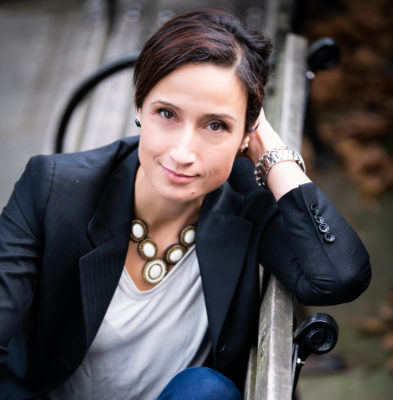On Monday, Oct. 23, the University of Lynchburg’s School of Humanities and Social Sciences and the School of PA Medicine will present “When Science Turns Evil: Medicine, Justice, and the Humanities,” a lecture by Dr. Brandy Schillace.
The 45-minute talk, which begins at 7 p.m. in Hall Campus Center’s Memorial Ballroom, will be followed by a Q&A session. The public is invited and admission is free.
Schillace — pronounced “skil-AH-chay” — is an author, historian, podcast host, and editor-in-chief of the journal BMJ Medical Humanities.

On her website, she writes of growing up “in an underground house, next to a graveyard, in abandoned coal lands … with a pet raccoon.” Her community “skirted the poverty line” and was a “place of failed industry and orange rivers, poor health, and poorer access” to health care.
“As a result, I spent my childhood reading a lot about diseases and going to a lot of funerals [and] ended up with a PhD and career in science history, which is probably a likely thing to happen when you spend your early years in a cemetery.”
So, it shouldn’t be surprising that some of Schillace’s research interests, which largely inhabit the medical humanities realm, are a bit out of the ordinary.
Her 2021 book, “Mr. Humble and Dr. Butcher: A Monkey’s Head, the Pope’s Neuroscientist, and the Quest to Transplant the Soul,” tells the true story of a 1970s scientist who — akin to Dr. Frankenstein — successfully transplants the head of one monkey onto the body of another.
According to Schillace, her forthcoming book, “The Intermediaries,” is “about the first trans and LGBTQ rights movement that took place in Germany between world wars. I will tell a story about race, gender, disability, and social justice.
“It’s also the story of how science and medicine were turned to evil ends, how Nazis burned down the LGBTQ library, how they used ‘science’ to justify genocide.”
In keeping with the theme of medical humanities, Schillace’s lecture will touch on the Central Virginia Training Center — formerly called the Virginia State Colony for Epileptics and Feebleminded — located in nearby Amherst County, Virginia.
The state-run facility was known for practicing eugenics.
For this reason alone, “this lecture literally hits close to home,” said Dr. Amy Merrill Willis, chair of the religious studies program and faculty contact for the medical humanities minor at Lynchburg. “I think it will be of interest to anybody in the community who is concerned about the ethical and unethical uses of medical science, which should be a lot of people.”
Also of interest to Willis is how Schillace describes herself: “an autistic, hyperlexic, nonbinary human with a photographic memory, [which] doesn’t mean what people think.”
Willis said it will be good for those in attendance, including her students, to hear from someone who identifies as neurodiverse and is “attracting a lot of notice” for her work in medical humanities. “It is a really big deal that she’s coming to our campus, in my opinion.
“She wants her audiences to see what that looks like and how it is the source of many of her cognitive gifts. She also talks about this part of herself and her story in order to point to some basic issues of inequity in the American health care system.
“She grew up in a working-class context, where there were significant pressures on her to mask this part of herself. I have had students who also openly identify as being on the autism spectrum, and her willingness to talk about her journey with autism has been a point of connection for them.”
Dr. Cheryl Coleman, a professor of English at Lynchburg, first heard Schillace speak on the webcast “Conversations about Art, Humanities and Health.” She found Schillace a “fascinating speaker, not only about the intersections between the humanities and medicine, but also about her own neurodiversity.
“I immediately started hoping to bring her to campus because she would have so much to share with our University community.”
Other books by Schillace include “Clockwork Futures” and “Death’s Summer Coat.” In addition to writing, she hosts the Peculiar Book Club, on YouTube, which features bestselling authors of what she describes as “unusual nonfiction” — Lindsey Fitzharris, Mary Roach, Carl Zimmer, Deborah Blum, and others.
Schillace has appeared on Travel Channel’s “Mysteries at the Museum,” NPR’s “Here and Now,” and on the History Channel. Her byline can be found at WIRED, Scientific American, The Globe and Mail, WSJ Books, and Medium.
For more information about the lecture, email shuss@lynchburg.edu.

